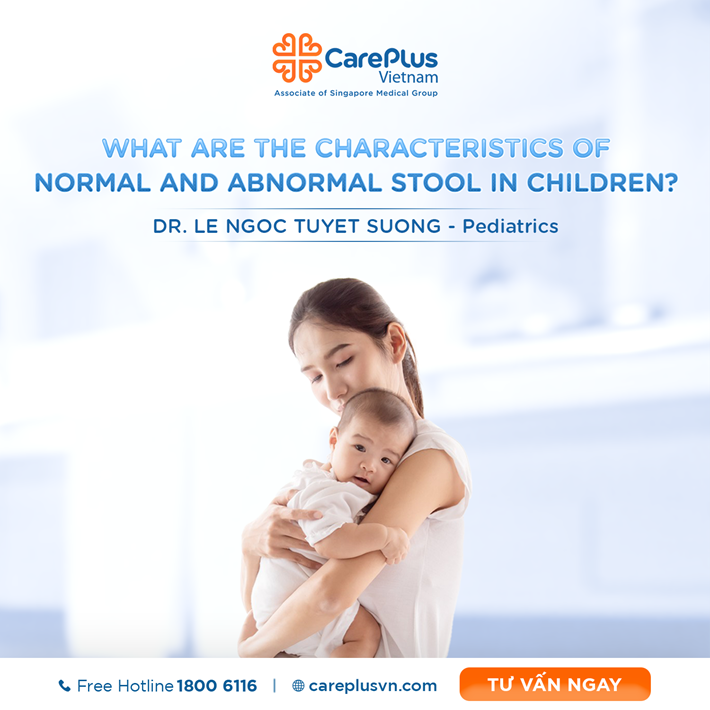WHAT IS NORMAL CHILDREN'S STOOL LIKE?
A newborn's stool can provide valuable insights into the child's health. Therefore, mothers should pay close attention to this aspect during the early stages of life. If any abnormal signs regarding the appearance or color of the stool are noticed, it's advisable to consult a doctor.

3/14/2024 10:01:26 AM
From birth to one year old, monitoring a baby's stool is an important part of baby's healthcare. Factors such as frequency, quantity, and odor can vary depending on each baby as well as the nutritional content introduced at different times. In this guide, the doctor will share basic information on how to recognize normal infant stool and when to be concerned about abnormal signs.
Recognizing Normal and Abnormal Children's Stool
Color of stool:
- Normal: In the first few days, stool may be greenish, also known as meconium, after which a child's stool typically transitions to yellow or light brown, brown, or green. These are normal stool colors and indicate normal digestion.
Green stool in children is normal but may sometimes appear black in low light conditions. Green stool is often caused by bile, certain foods, and medications. It is commonly seen in cases of diarrhea and is more prevalent in formula-fed infants compared to breastfed ones.
- Abnormal: Some stool colors warrant attention, including black or red stool, gray stool, or white stool.
-
White or light gray stool in children may be a sign of liver disease. Blockage of the bile duct in infants can lead to pale gray or light yellow stool. However, an all-milk diet can also result in white stool, as well as certain medications.
-
Black stool may be a sign of gastrointestinal bleeding as the acid in the stomach can turn blood into a blackish color. However, the cause could also be due to food items like licorice or grape juice, or the child taking iron supplements.
-
Red stool in children may also be a sign of blood, although most red stool in children is not due to blood. Red-colored stool could also result from certain medications or foods, such as red-colored frosting, food coloring, or tomato sauce.
Children should see a doctor if pale gray or white stool occurs two or more times, or if the stool continues to be unusual in color for more than 24 hours without an apparent cause. Or if the stool remains unusual 48 hours after stopping suspect foods or medications.
Consistency of stool:
- Normal: After the meconium phase, a child's stool typically becomes more formed. Breastfed infants usually have softer stool compared to formula-fed ones. Small specks in the stool are entirely normal, as they result from undigested fat.
- Abnormal: If stool is too hard or too loose, or if it contains bubbles, it could be a sign of digestive issues or inflammation of the intestines. Hard stool is a sign of constipation, especially when accompanied by blood, indicating the possibility of anal fissures due to constipation.
.jpg)
Refer to the Bristol Stool Chart to monitor the consistency of stool.
Odor of stool:
- Normal: A newborn's stool typically has a mild, not overly unpleasant odor. Breastfed infants may have stool with a stronger odor compared to formula-fed ones. The odor of stool becomes stronger as a child begins solid foods and consumes protein-rich foods.
- Abnormal: The odor of stool may become very foul, acidic, or unusual if the child has intestinal inflammation or is not digesting food efficiently.
Quantity and frequency:
- Normal: The quantity and frequency of stool may vary depending on the child's diet (breastfed or formula-fed). Children may have stool every day or every other day. Ideally, a child should have a bowel movement every day.
Initially, breastfed infants tend to have more frequent bowel movements than formula-fed ones because breast milk is more easily digestible. However, between 3 to 6 weeks of age, breastfed infants may start to have fewer bowel movements, sometimes only once or twice a week. Formula-fed infants typically continue to have daily bowel movements. It is normal for infants to strain during bowel movements as it is a greater challenge for them since they lie flat and lack gravity to assist them.
- Abnormal: If a child goes without stool for an extended period or has very frequent bowel movements in a day, it could be a sign of digestive issues or diarrhea and should be carefully monitored. Children having bowel movements less than three times a week should be evaluated by a doctor.
What should mothers do to help their child have good bowel movements?
Depending on the nutritional needs and physiology of the child, mothers can implement the following measures to facilitate smooth bowel movements for their baby:
-
Breastfeed the baby on demand.
-
Find an appropriate formula milk for the child.
-
Regularly monitor the child's bowel movements.
-
Thoroughly sterilize feeding equipment.
-
Wash hands thoroughly before feeding the baby.
-
Ensure cleanliness of food and water sources used for formula milk preparation.
A newborn's stool can provide valuable insights into the child's health. Therefore, mothers should pay close attention to this aspect during the early stages of life. If any abnormal signs regarding the appearance or color of the stool are noticed, it's advisable to consult a doctor.
In any case, if you have any concerns about your child's stool, contact your doctor or healthcare professional immediately for advice and examination. Caring for a newborn's health requires careful observation and special care, and recognizing abnormal signs in stool can help detect and treat issues as early as possible, keeping the baby healthy and thriving.